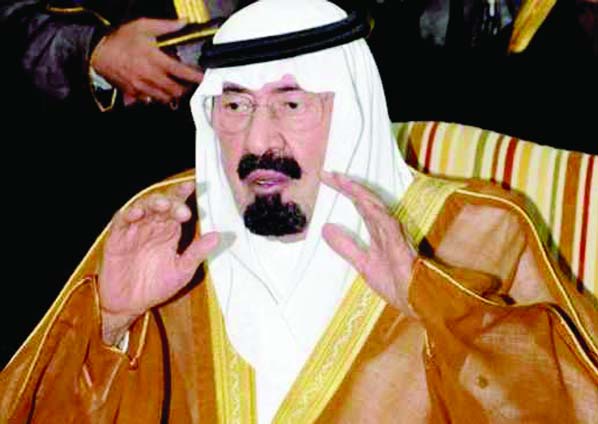
BBC Online :Saudi King Abdullah bin Abdulaziz has died, royal officials have announced, weeks after he was admitted to hospital.Abdullah, who had ruled since 2005 and was said to be aged about 90, had been suffering from a lung infection.His 79-year-old half-brother, Salman, has been confirmed as the new king.Within hours of his accession to the throne of the oil-rich kingdom, King Salman vowed to maintain the same policies as his predecessors. “We will continue adhering to the correct policies which Saudi Arabia has followed since its establishment,” he said in a speech broadcast on state television.Abdullah had suffered frequent bouts of ill health in recent years, and King Salman had recently taken on the ailing monarch’s responsibilities. Prior to announcing Abdullah’s death, Saudi television cut to Koranic verses, which often signifies the passing of a senior royal.A statement said Abdullah had died at 01:00 (22:00 GMT Thursday). Here in Saudi Arabia’s second city, the streets were quiet yesterday morning as many people flocked to mosques for Friday prayers. There is a subdued sadness in the air as Saudis take in the loss of their king. People throughout the kingdom are mourning a man whom they viewed as a good monarch. Another of the late king’s half-brothers, Muqrin, who is in his late 60s, has been named the new crown prince, according to an official statement. Abdullah, Salman and Muqrin are all sons of the founder of modern Saudi Arabia, King Abdulaziz, usually referred to as Ibn Saud, who died in 1953.King Salman called on the royal family’s Allegiance Council to recognise Muqrin as his heir. He swiftly appointed Interior Minister Prince Mohammed bin Nayef as deputy crown prince, making him second in line to the throne, and named his own son, Mohammed bin Salman, as defence minister.Other ministers, including foreign, oil and finance were kept in place, state TV reported.King Salman bin Abdulaziz Al Saud: “We will never deviate from our constitution” The new king’s profile was updated on his official Twitter account, where he wrote: “I ask God to help me succeed in my service of the dear [Saudi] people.”In keeping with traditions of Wahhabism – the ultra-conservative form of Sunni Islam followed by the kingdom – King Abdullah was buried in an unmarked grave immediately after Friday prayers.The Saudi religious establishment views every aspect of life and death as a submission to God’s supreme will, and protocol permits no official mourning period. Government offices stay open and flags remain at full mast.Saudi Arabia under King Salman faces a number of challenges. The first is ensuring the succession passes smoothly without any divisive jockeying for power within the ruling family. Then there is the ongoing threat from jihadists, both at home and across its borders.Saudi Arabia is now sandwiched between an aggressive Islamic State (IS) to the north and al-Qaeda in Yemen to the south. Saudi warplanes have joined the US-led coalition in air strikes against IS, but this is deeply unpopular with many Saudis.

